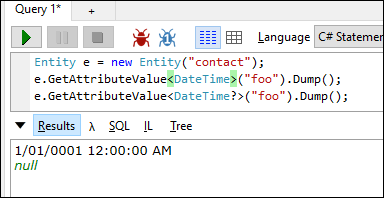
|
|
#1 |
|
Участник
|
crmtipoftheday: Tip #1137: Learn language and study API to simplify your code
Источник: https://crmtipoftheday.com/1137/lear...ify-your-code/
============== I already wrote about the benefits of learning new language features. Equally important is to understand what assemblies are available as part of Dynamics 365 SDK, how they work, what classes and interfaces are available, and how the edge cases work (basically, “what-if” scenarios, like “what if this is null”). This week I had “privilege” to sink my teeth into some old code written by a developer with a particularly severe case of spießrutenlaufen. My eyes are still bleeding. Consider this fragment: DateTime? DateAccepted = null;if(entity != null) { DateAccepted = (entity.Contains("new_dateacc") && entity["new_dateacc"] != null && entity["new_dateacc"] != string.Empty) ? entity.GetValue("new_dateacc") : (DateTime?)null;}I did some line wrapping for your viewing pleasure, original code was a one-liner. At this point in time you should be able to hear my eyes rolling all the way to the back of my head. How about this instead? var DateAccepted = entity?.GetAttributeValue("new_dateacc");There is no magic here, I simply used:
 As you can see, return seems to be default(T) for non-nullable T types. Yep, I’m using the goodness of LINQPad, a must have for every developer. (Social media cover photo by Easton Oliver on Unsplash) Источник: https://crmtipoftheday.com/1137/lear...ify-your-code/
__________________
Расскажите о новых и интересных блогах по Microsoft Dynamics, напишите личное сообщение администратору. |
|
|